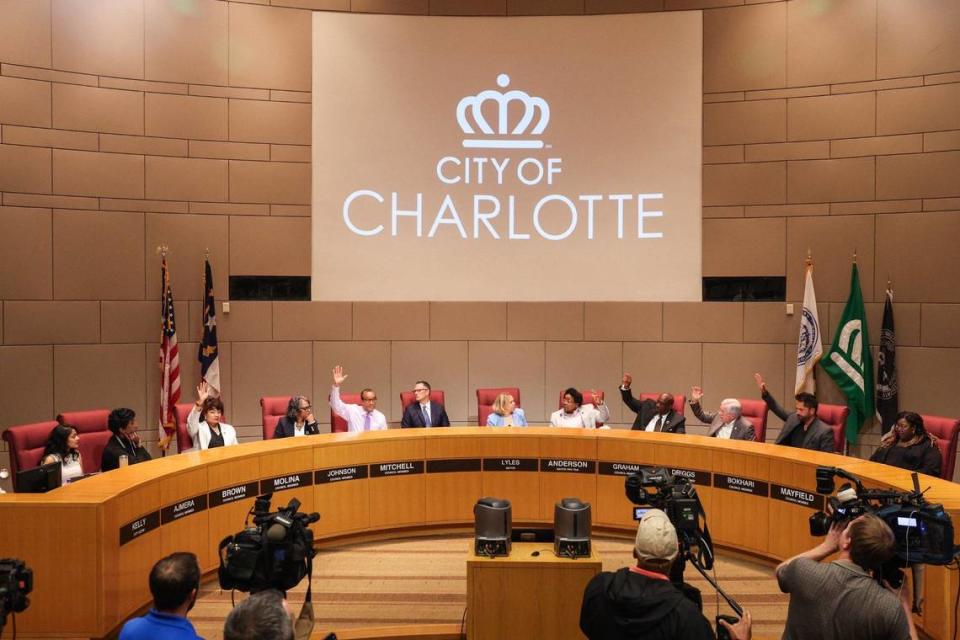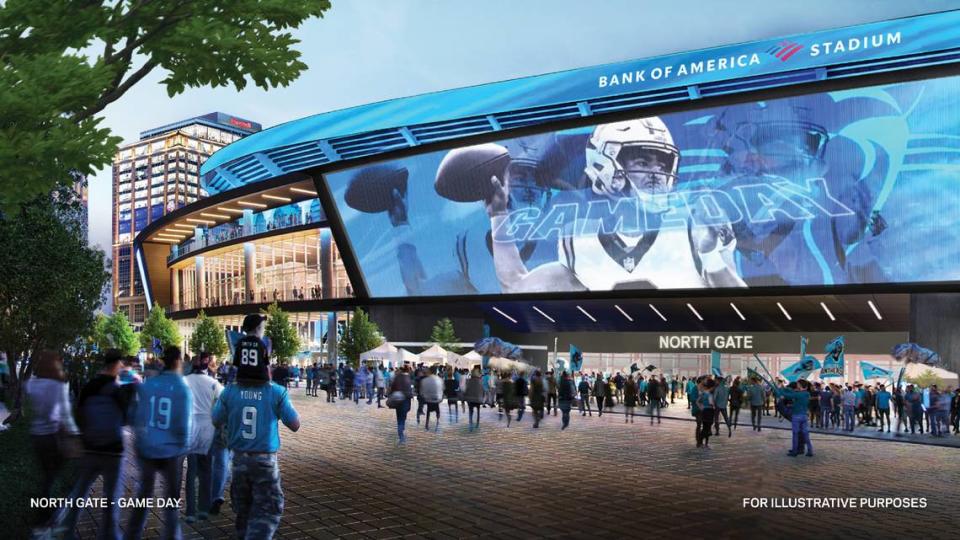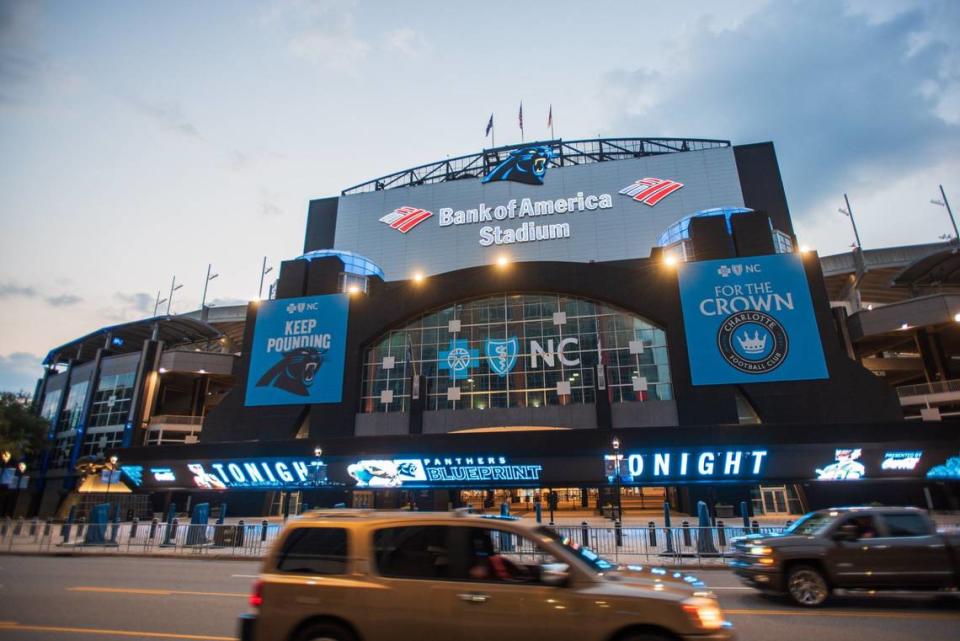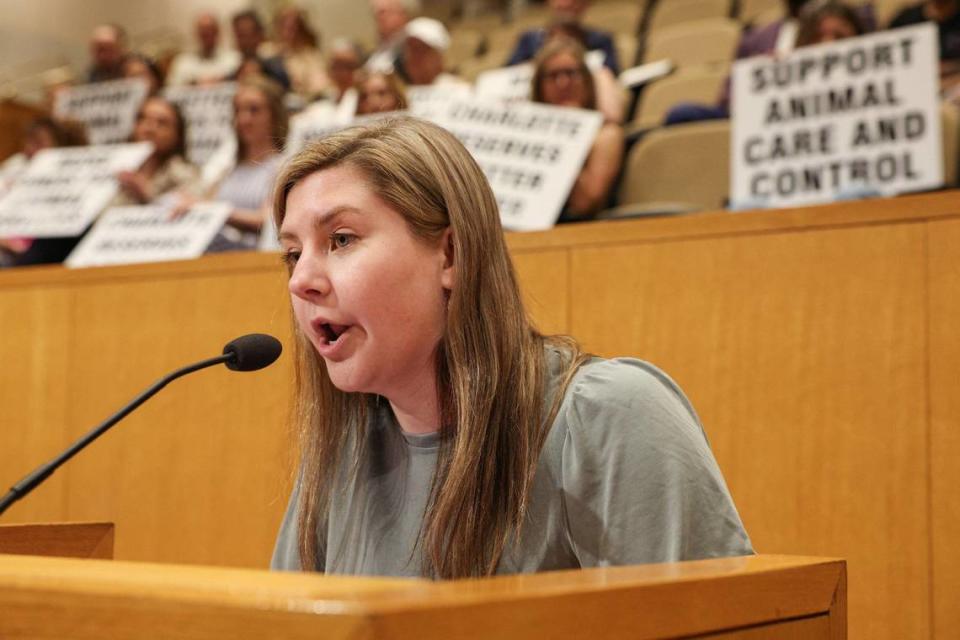Divided Charlotte City Council OKs terms of $650M Bank of America Stadium renovations
The city of Charlotte on Monday agreed to contribute hundreds of millions of dollars to Bank of America Stadium’s renovation and start talking about a new stadium in 2037.
In a 7-3 vote, the Charlotte City Council agreed to terms of a deal that commits $650 million to update the nearly 30-year-old home of the Carolina Panthers and Charlotte FC. The deal — struck between the David Tepper-owned Tepper Sports and Entertainment and the city of Charlotte — sets in motion one of the largest public expenditures in city history for a single project. In 2037, two years before the earliest the teams could leave, Charlotte also must start conversations about building a new stadium, according to terms of the agreement.
Council members who voted against the deal included Dimple Ajmera, Tiawana Brown and Reneé Johnson. Council member LaWana Mayfield initially didn’t raise her hand during a roll call for “yes” votes, but she added her vote immediately after seeing the number of people in favor.
Assistant City Manager Tracy Dodson and City Attorney Patrick Baker say staff members now will create legal documents and secure financing for the deal.

To Mayor Vi Lyles, Monday night was a triumphant one for the future of Charlotte.
“What we’ve done tonight is actually what Charlotte is all about,” Lyles told reporters after the vote. “We know that we’re growing fast. We know that people are choosing our city. … We’re going to have opportunities for people not only to come here to work, but to be in a place where we are a regional magnet for entertainment and sports. I think that’s what the council found out.”
The plan calls for $650 million paid by hospitality tax revenue, which can only be spent on a limited number of tourism-related projects. The projects, per the city, can only include “maintenance for the Convention Center, venues that seat 60,000 people or more and amateur sports facilities.”
The terms approved Monday include a 20-year non-relocation agreement for both teams, but they could leave as early as 15 years as long as Tepper Sports pays remaining city debt associated with the renovation deal. The remaining five years are considered a “soft tether.”
WHAT TO KNOW: $650 million Bank of America Stadium renovation plan in Charlotte
Business and hospitality leaders swiftly rallied in support of the plan earlier this month, boasting the cultural and economic impact Bank of America Stadium brings to North Carolina’s largest city. They urged the council to not shy away from being a “big-league city” three decades after Charlotte beat long odds to land its NFL franchise.
Many community members expressed concerns coming into Monday. Some criticized the city’s lack of transparency about the process and claimed the city’s efforts to receive public input wasn’t a priority. Others expressed concern about committing such a sum to Tepper — an owner worth $20.6 billion who has a well-documented history of backing out of huge construction deals, none more messy than the Rock Hill practice facility failure in March 2022.
On Monday, council members passed the plan while referencing transparency problems, opposition comments from the public and Tepper’s deal-making history in Charlotte and Rock Hill, South Carolina.
Now, the process begins to construct what Charlotte Sports Foundation leader Danny Morrison previously called “the best outdoor stadium in America.”
The work, according to Panthers President Kristi Coleman, begins immediately.
“We are proud to call the Carolinas our home,” Coleman told reporters after the vote. She was joined by several Tepper Sports and Entertainment executives, including Charlotte FC President Joe LaBue and TSE Chief Venues Officer Caroline Wright. Neither David Tepper nor his wife, Nicole, were present for Monday’s hearing. “Dave and Nicole are committed to Charlotte, and they’ve shown that over the last six years. We’re excited for this partnership and for the future.”
In a statement issued after the vote, Tepper said he looks forward to “delivering a venue that meets the needs of our community, players and fans for years to come.”

Where is the public money going?
Renovations for Bank of America Stadium will begin in 2025, the Observer previously reported. Those upgrades include:
New seats installed throughout the upper and lower bowls
Improved accessibility throughout the facility for people with disabilities
Stadium safety and security enhancements, including improved lighting
A reimagined South Lawn Pavilion area that can be used as a community gathering spot and outdoor classroom on game days and non-event days
Upgraded restrooms
Exterior enhancement
Modernization of mechanical, plumbing, electrical and HVAC systems

The plan doesn’t include adding a dome or retractable roof for the stadium — a feature that’s common for venues chosen to host major sports championships, including NCAA basketball Final Fours and Super Bowls.
City Council member Malcolm Graham, who chairs the council’s economic development committee, previously said Tepper Sports made the decision that taking on the cost of a roof “was not the direction that they wanted to go.”
After the meeting Monday, he focused mostly on the big-picture implications this vote will have on the city’s future.
“More importantly, it’s about travel and tourism, which is what I said from the dais. One in nine individuals in this community work in that industry, busboys and waiters and waitresses and Uber drivers and small business owners and those who work at the hotels,” Graham said. “So I’m very happy that this went through. Sports and Entertainment is in the DNA of the city of Charlotte.”
The total city contribution will be capped at $650 million. The rest of the money will come from Tepper Sports and Entertainment — to the tune of $150 million for immediate renovations and $421 million for anticipated future renovation costs over the term of the deal.
The $650 million also includes a $15 million contribution to the construction of a field house for the Panthers’ previously approved practice facility. The city and TSE will also each pay $500,000 annually to help with traffic management associated with events at the stadium, Dodson said.

Where will Charlotte’s $650M come from?
The city’s investment will come from debt it takes on and repays with hospitality tax revenue — the Convention Center Fund. Those dollars come from a 1% sales tax on prepared food and beverages and a 3% hotel occupancy tax, and they can only be spent on certain tourism-related projects.
The General Assembly last year extended Mecklenburg County’s 1% meals tax until 2060. The extension was something Charlotte’s hospitality industry and local leaders began to advocate for more as reports of an impending ask from the Panthers surfaced.
The hotel occupancy tax wasn’t similarly extended past its 2038 expiration.

A deeper look at what Charlotte thinks of the stadium plan
Charlotte residents raised questions about the city contributing money to stadium renovations at a City Council public hearing last week and through an online portal. Among the chief concerns: whether Tepper is trustworthy, whether the money could be better spent and whether city leaders listened to residents.
Scott Bryan, who also spoke at last week’s council meeting, said Monday the vote felt “rushed” and that she was mostly concerned the vote happened without “fair public input or fair public access to more details.”
“I think if we really want to speak truth tonight, that’s what is really weighing people. And I hope it’s weighing on each of you,” Bryan said.
She added, “The economic committee did not fulfill its responsibility to build in enough time during these long negotiation discussions for public or council input. I don’t know anybody in this chamber tonight who can dispute that.”

Supporters in the business and hospitality industry cited the economic impact of the stadium and the events it hosts, saying the improvements will help draw more games and concerts to Charlotte. The stadium had a $1.1 billion economic impact on the Charlotte metro area in 2023, according to a study commissioned by Tepper Sports and referenced by city staff.
But Davidson University professor Fred Smith, who teaches sports economics and studies athletics’ financial impact, said the figure presented “sounds like it’s far too large.” It is unclear how that $1.1 billion figure was calculated.
“That is not uncommon when these sorts of things are being discussed,” he said.
Those opposed to the deal brought up similar concerns on Monday — specifically about economic benefits a public-private investment into a stadium will bring. Ed Driggs, who represents District 7 on the council, offered a rebuttal to those concerns.
“We have to make a big-picture decision tonight, a major one,” Driggs said. “I agree that the economic impact analysis is kind of hard to interpret. I’m not betting a lot in that number.”
But he said the public and private money poured into the stadium will produce a return — as evidenced by the fact that “a great majority of large American cities have NFL teams and partner with their owners with large amounts of money.”
Many concerns revolved around Tepper. Brown, who represents District 3, called the past behavior of someone asking for $650 million “ridiculous,” and specifically alluded to Tepper tossing a drink on a fan after a loss last season — an action that was fined by the NFL for $300,000.
“I think this evening, we’ve had some conversation around an individual,” said Mayor Pro Tem Danté Anderson. “And this conversation, this deal, isn’t about an individual. It’s about the city of Charlotte, and how she will grow. And how we, as stewards of her growth, will make the best decisions possible to ensure that her residents, that the economy, that the environment will not only continue to grow and thrive — but it will be a welcoming environment.”
What about a new Panthers stadium?
The city on Monday night also committed to talk about an entirely new stadium. On or before April 1, 2037, the City of Charlotte and TSE will “commence good faith negotiations regarding the design and construction of a new stadium” in Charlotte, the city’s agenda documents state. The timeline for that stadium’s completion would be the 2046 season.
The year 2037 is 13 years from now — two years before the earliest the Panthers could leave under the $650 million renovation deal passed Monday.
The city, through a spokesperson, clarified that this does not guarantee there will be a new stadium in 2046. Rather it is “an acknowledgment that Bank of America Stadium will be 50 years old at the end of the current proposed agreement, and that the two parties need to address that,” the city said in a statement. A similar provision was included in agreements with the Hornets related to Spectrum Center renovations.
Those details will be scrutinized in the coming weeks, months and years. What can’t be denied: the impact sports have on the community, said Anderson, a Charlotte native.
“Sports unite people,” Anderson said Monday. “Football, soccer. Sports are really the great equalizer, where no matter what your background is — whether it’s socioeconomic or diverse perspectives — you can come together as a team and collectively work to win, and to be better. And that resonates not only with the Panthers, not only with our soccer team, but it resonates with our residents.”
In our CLT Politics newsletter, we offer exclusive insight into Charlotte-region politics sent to your inbox on Thursdays. Subscribe for free. Story idea? mramsey@charlotteobserver.com.


